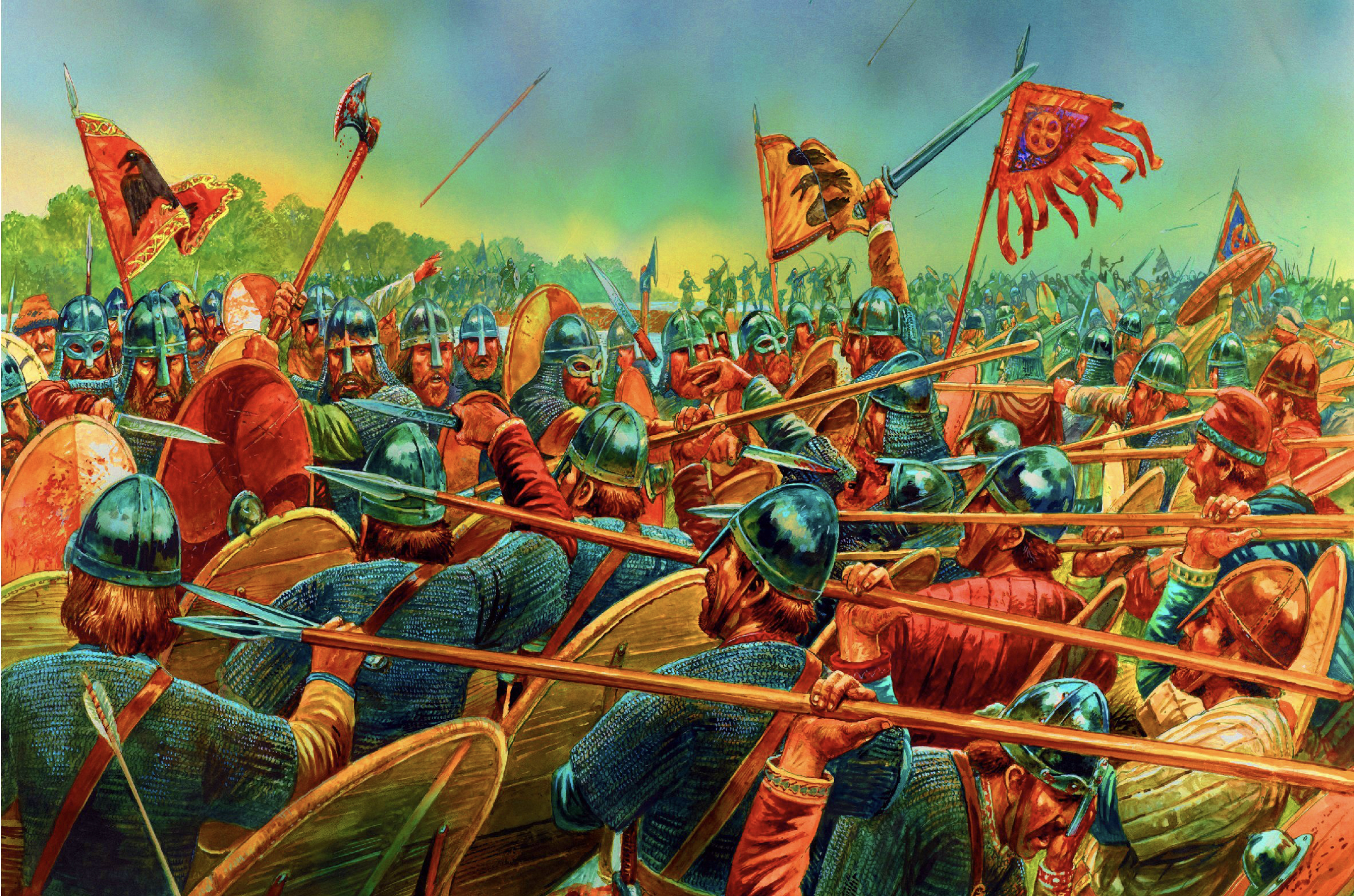The Battle of Maldon: Lessons in Heroism & Self-Sacrifice for Modern Men of Service
by Donavon L Riley
“Then, bearing his shield, [Byrhtnoth] ordered his warriors to advance,
all those who stood on the riverbank.
Nor could that army go unto the other because of the water;
where the flood came flowing after the ebb-tide.
The watery streams separated them. It seemed to them too long
before they could muster their spears together.
There they stood in press alongside Pante’s stream,
the greatest of the East-Saxons and the spear-hordes.
Nor could any of them afflict the other side,
except those who were felled by the showering of arrows.
The tide went out—the float-men stood ready,
the many Vikings, eager warriors.” (62-73)
The Battle of Maldon was a pivotal event in English history that took place in the year 991 AD. It was a significant conflict between the English, led by Ealdorman Byrhtnoth, and Viking raiders. The battle occurred near Maldon, a town in Essex, England. The Vikings, under the command of Olaf Tryggvason, sought treasure and supplies, and a confrontation with the English ensued when they were denied tribute. Ealdorman Byrhtnoth and his warriors valiantly defended their homeland but were ultimately defeated, with Byrhtnoth himself falling in battle. The battle is commemorated in the Old English poem “The Battle of Maldon,” which glorifies the heroic deeds and virtues of the English warriors who stood resolute in the face of overwhelming odds, emphasizing the enduring values of honor, courage, and justice.
And so, in the library of early Anglo-Saxon literature, the epic poem “The Battle of Maldon” stands as a timeless tale to valor, honor, and unwavering commitment to duty. Especially, for those who serve in vocations that require them to protect and defend others, this centuries-old saga offers profound lessons on the virtues that define true heroism and self-sacrifice.
To this point, we begin at the end, with one of the poem’s most powerful verses: “Resolution should be the tougher, the heart keener, and the mind should be greater when our power diminishes.” (309-19)
In the face of overwhelming odds, these lines capture the essence of what it meant to be a hero at the beginning of the 11th century. In modern times, as we are confronted by challenges that test our mettle, these words remain an unwavering call to persevere — to prepare ourselves mentally, physically, and emotionally for those times when we are called to stand firm against adversity.
The heroes of “The Battle of Maldon” exemplify honor in the face of danger. They know that remaining steadfast in their duty comes before personal safety, as it says:
“Then they went forth, reckoning not of their lives.
These retainers fought sternly, fierce spear-bearers,
and they asked God that they be allowed to avenge
their friendly lord and work downfall among their foes.” (260-4)
The narrative therefore also underscores the importance of justice, even in the direst of circumstances. The warriors of Maldon, in their unwavering commitment to defending their homeland, demonstrate the essence of justice. They understood that their cause was just, and they were willing to lay down their lives for it. For us who live in the modern world, where justice is often treated as a nebulous concept, the men of Maldon stand as a testament to the enduring commitment to what is right.
Finally, “Byrnysswiga” or the battle of the warriors, is a central theme in the poem. The battles they face are fierce, but they do not falter. The words of the poem resound:
“They all stood so firmly stiff-minded,
the young warriors in the battle, thinking eagerly
who they could soonest conquer
with their swords, the life of fated men,
the warriors with their weapons.
Slaughter fell upon the earth.
They stood steadfast…” (122-9)
Even in the midst of turmoil, they fight on, facing the Viking onslaught. Again, wherever we are called into service to help, save, and defend others, be it on the battlefield, in the line of duty, or at home, can find inspiration in their unyielding resolve.
“The Battle of Maldon” is not just a poem from the distant past; it is a living testament to the virtues that continue to define heroes today. All those who carry the torch of honor, courage, and justice, can be encouraged and strengthened by this poem, know that they carry on the tradition of heroism and self-sacrifice just as those warriors did in defending their land and families. So as we confront the complexities of modern challenges, the lessons of Maldon remind us that we walk in the footsteps of greatness, embodying the very virtues that have remained constant, that made men great warriors and even greater servants, through the ages.
The views and opinions expressed on this website are solely those of the original authors and contributors. These views and opinions do not necessarily represent those of Spotter Up Magazine, the administrative staff, and/or any/all contributors to this site.
